The UEFA European Championship, commonly known as the Euros, stands as the pinnacle of international football in Europe. Held every four years, this prestigious tournament has grown from a relatively modest affair to a global spectacle, captivating billions of viewers worldwide. From its inception in 1960, the Euros has not only showcased the continent’s finest footballing talent but has also delivered unforgettable moments of drama, skill, and national pride. The quest for the coveted Henri Delaunay Trophy has witnessed triumphs of footballing giants and underdog stories that have resonated through history. This article delves into the complete Euro Championship Winners List, celebrating each nation that has etched its name into European football folklore.
| Year | Winners | Runners-up | Venue | Attendance |
|---|---|---|---|---|
| 2024 | Spain | England | Olympiastadion | 65,600 |
| 2021 | Italy | England | Wembley Stadium | 67,173 |
| 2016 | Portugal | France | Stade de France | 75,868 |
| 2012 | Spain | Italy | Olimpiyskiy National Sports Complex | 63,170 |
| 2008 | Spain | Germany | Ernst-Happel-Stadion | 51,428 |
| 2004 | Greece | Portugal | Estadio da Luz | 62,865 |
| 2000 | France | Italy | Feijenoord Stadion | 50,000 |
| 1996 | Germany | Czech Republic | Wembley Stadium | 73,611 |
| 1992 | Denmark | Germany | Ullevi | 37,800 |
| 1988 | Netherlands | Soviet Union | Olympiastadion | 62,770 |
| 1984 | France | Spain | Parc des Princes | 47,368 |
| 1980 | West Germany | Belgium | Stadio Olimpico | 47,860 |
| 1976 | Czechoslovakia | West Germany | Stadion FK Crvena Zvezda | 30,790 |
| 1972 | West Germany | Soviet Union | Heysel Stadium | 43,066 |
| 1968 | Italy | Yugoslavia | Stadio Olimpico | 32,886 |
| 1964 | Spain | Soviet Union | Santiago Bernabeu | 79,115 |
| 1960 | Soviet Union | Yugoslavia | Parc des Princes | 17,966 |
A Look at Every Euro Championship Winner
Ten different nations have tasted European Championship glory, each victory carrying its unique narrative and significance. From dominant displays by footballing powerhouses to miraculous triumphs by unexpected underdogs, the list of Euro winners reflects the unpredictable and captivating nature of international football. Let’s explore each winning nation’s journey to European Champion status, starting with the teams who have lifted the trophy once.
Greece – 2004
The Miracle of Portugal
Greece’s Euro 2004 victory remains one of the most astonishing upsets in football history. Entering the tournament as 150-1 outsiders and with no prior major international tournament experience, Otto Rehhagel’s team defied all expectations. Built on a foundation of rock-solid defense and tactical discipline, Greece showcased a pragmatic yet effective style of play that frustrated far more fancied opponents. Key players like Angelos Charisteas, Theodoros Zagorakis, and Traianos Dellas formed the backbone of this resilient side.
Their journey began with a shock 2-1 win over hosts Portugal in the opening game and culminated in an even more improbable 1-0 victory against the same opponent in the final. Charisteas’s header in the final secured a victory that sent shockwaves through the footballing world and cemented Greece’s place in the Euro Championship winners list. This triumph was not just a sporting achievement; it was a national fairytale, celebrated wildly across Greece and remembered as the “Greek Miracle.”
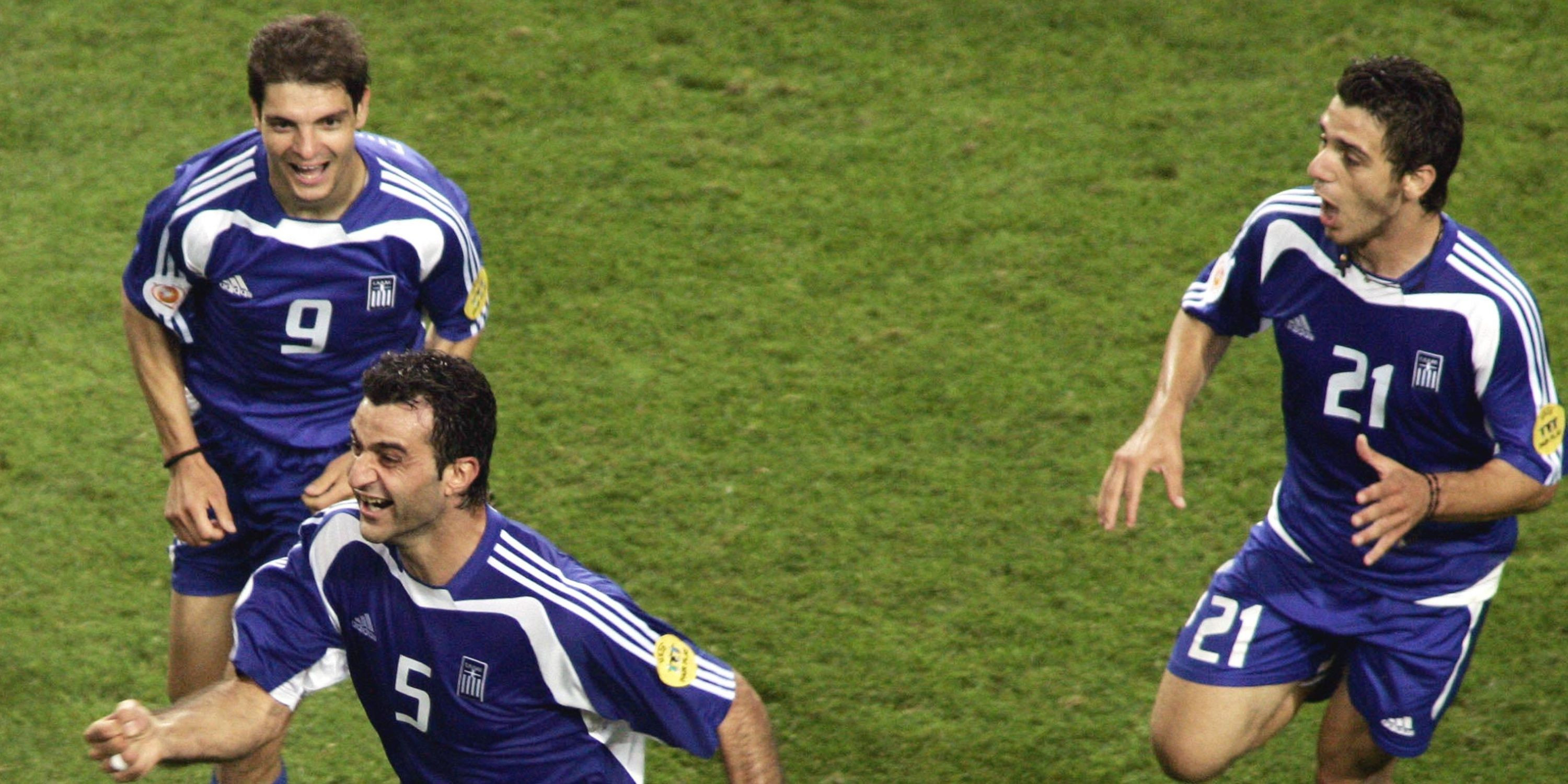 Angelos Charisteas scoring the winning goal for Greece in the Euro 2004 final against Portugal, a pivotal moment in their unexpected championship victory.
Angelos Charisteas scoring the winning goal for Greece in the Euro 2004 final against Portugal, a pivotal moment in their unexpected championship victory.
Denmark – 1992
Danish Dynamite’s Unexpected Triumph
Denmark’s Euro 1992 win in Sweden was another fairytale story of an underdog defying the odds. Remarkably, Denmark hadn’t even qualified for the tournament; they were late replacements for Yugoslavia, who were excluded due to political unrest. With little time to prepare and low expectations, Richard Møller Nielsen’s team embarked on an unforgettable journey.
Initially, their campaign was slow to ignite, but a crucial victory against France in their final group game propelled them into the semi-finals. There, they overcame the reigning European champions, Netherlands, in a penalty shootout. The final against Germany, the reigning world champions, seemed a bridge too far, but inspired performances, including John Jensen’s stunning strike and Kim Vilfort’s emotional goal, secured a 2-0 victory. Denmark’s unexpected Euro 1992 triumph, achieved against all odds, is fondly remembered as “Danish Dynamite” and stands as a testament to the magic of football.
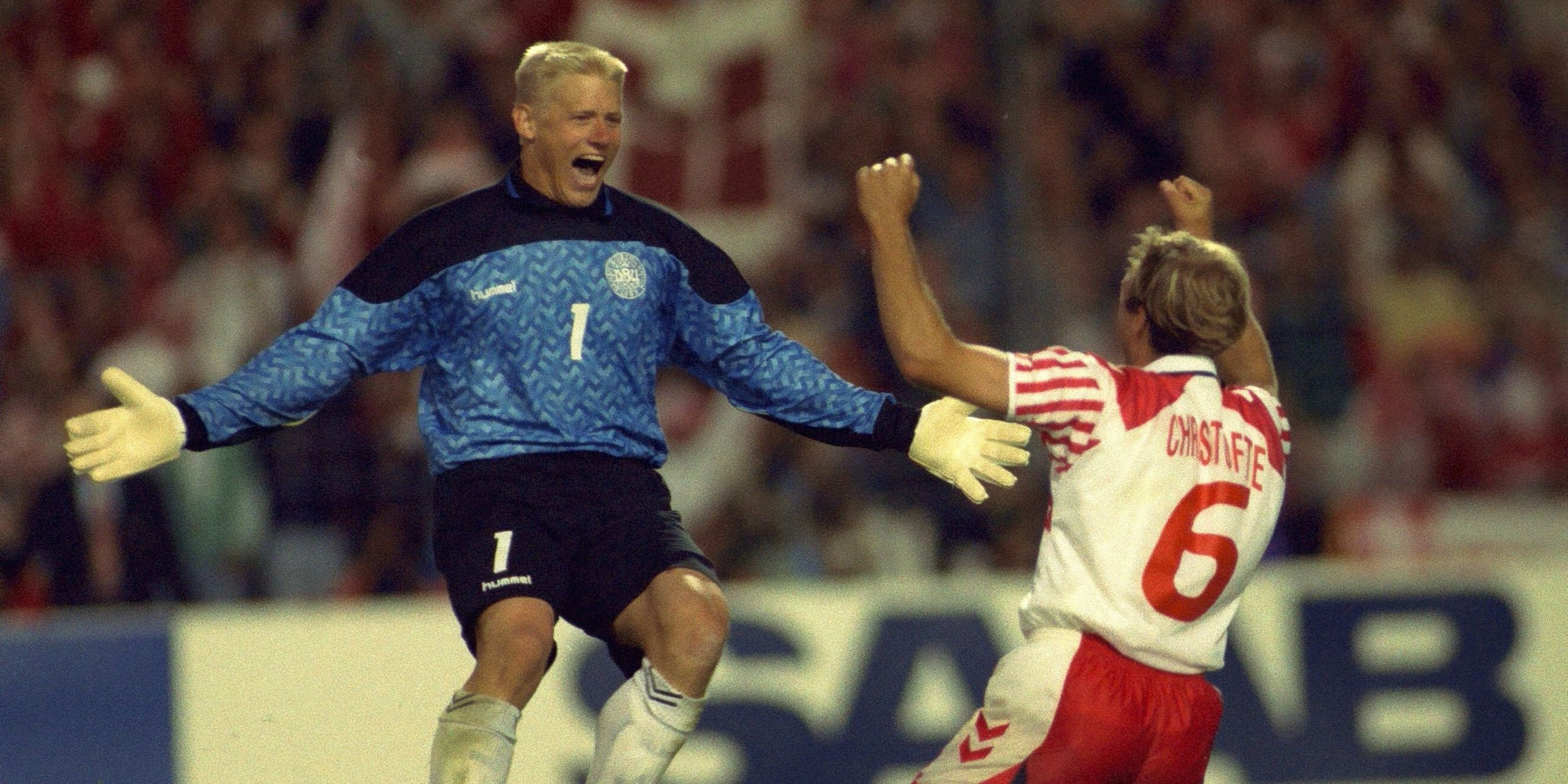 The Denmark Euro 1992 winning team celebrating their historic victory, a symbol of their unexpected triumph and national pride.
The Denmark Euro 1992 winning team celebrating their historic victory, a symbol of their unexpected triumph and national pride.
Netherlands – 1988
Redemption and Van Basten’s Masterpiece
The Netherlands’ Euro 1988 victory in West Germany was a moment of redemption and footballing artistry. Having endured past heartbreaks, including the 1974 World Cup final defeat to West Germany, the Dutch entered the tournament with a burning desire to prove their pedigree. Under the guidance of Rinus Michels and boasting a golden generation of players like Ruud Gullit, Frank Rijkaard, and Marco van Basten, the Oranje were a force to be reckoned with.
A pivotal moment came in the semi-final against hosts West Germany. Marco van Basten’s late winner not only secured a place in the final but also exorcised the ghosts of past defeats. The final against the Soviet Union witnessed one of the greatest goals in Euro history – Van Basten’s audacious volley from an improbable angle. This moment of genius, coupled with Ruud Gullit’s opener, sealed a 2-0 victory and delivered the Netherlands their first and only major international trophy, a triumph celebrated euphorically by the nation.
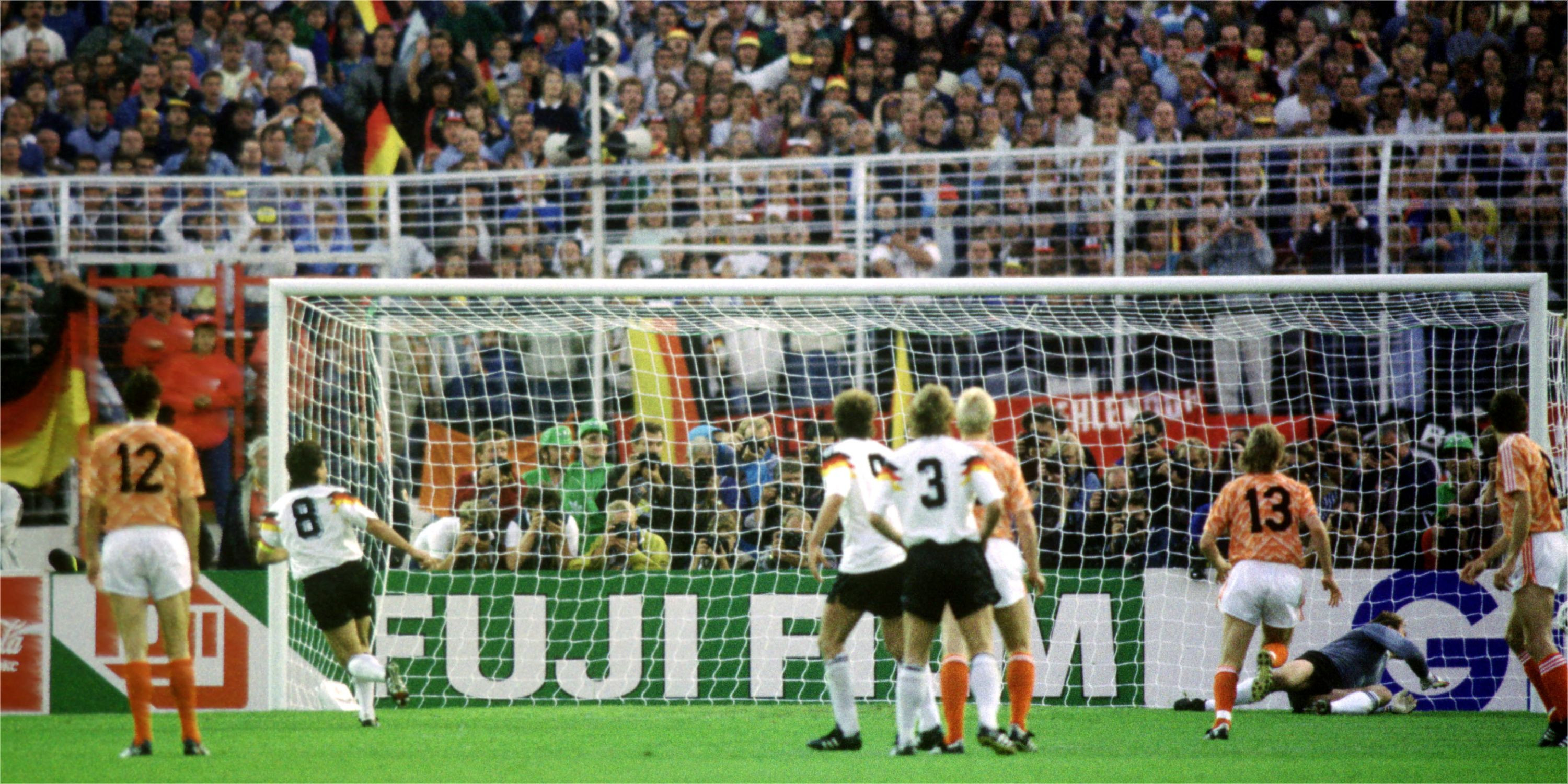 Marco van Basten scoring his legendary volley in the Euro 1988 final against the Soviet Union, an iconic goal that sealed the Netherlands' victory.
Marco van Basten scoring his legendary volley in the Euro 1988 final against the Soviet Union, an iconic goal that sealed the Netherlands' victory.
Portugal – 2016
Ronaldo’s Tears of Joy and Eder’s Decisive Strike
Portugal’s Euro 2016 victory in France was a story of resilience, determination, and finally overcoming years of near misses. Led by Cristiano Ronaldo, Portugal had consistently reached the latter stages of major tournaments but had often fallen short. In the Euro 2016 final against hosts France, Ronaldo’s dream seemed to shatter when he was forced off injured early in the game.
However, adversity galvanized the team. Despite losing their talisman, Portugal dug deep, displaying incredible defensive resolve and tactical discipline. Substitute striker Eder, who had been largely criticized, became the unlikely hero, scoring a stunning long-range winner in extra time. Ronaldo, despite his injury, remained an inspirational figure on the sidelines, urging his team on. The final whistle sparked scenes of jubilation as Portugal clinched their first major international trophy, a moment filled with emotion and relief, especially for Ronaldo, whose tears this time were of pure joy.
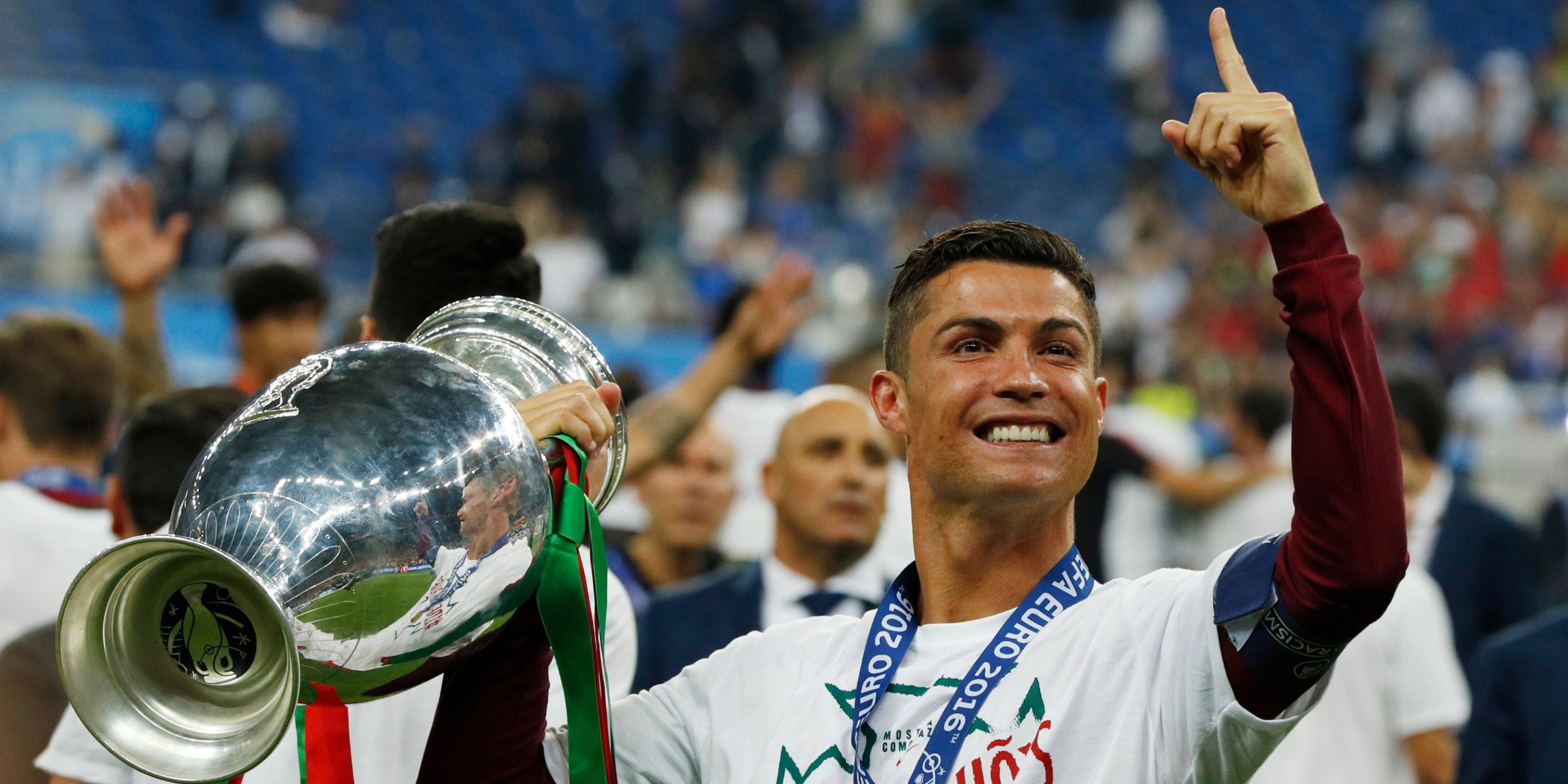 Cristiano Ronaldo celebrating Portugal's Euro 2016 victory, a moment of triumph and emotion after overcoming injury and leading his team to their first major trophy.
Cristiano Ronaldo celebrating Portugal's Euro 2016 victory, a moment of triumph and emotion after overcoming injury and leading his team to their first major trophy.
Czech Republic (Czechoslovakia) – 1976
Panenka’s Audacity and Belgrade Triumph
Czechoslovakia’s Euro 1976 victory in Yugoslavia is synonymous with Antonín Panenka’s audacious penalty in the final shootout against West Germany. The tournament itself was a thrilling affair, culminating in a dramatic final in Belgrade. Czechoslovakia, featuring players like Ivo Viktor and Karol Dobiaš, played an attacking brand of football that captivated audiences.
The final against West Germany was a back-and-forth encounter, ending 2-2 after extra time. In the ensuing penalty shootout, with the score at 4-3, Panenka stepped up to take the decisive penalty. Instead of a conventional powerful shot, he delicately chipped the ball down the middle of the goal as Sepp Maier dived to his left. Panenka’s iconic penalty, a moment of sheer brilliance and nerve, secured Czechoslovakia’s only major international title and forever etched his name into football folklore.
Russia (Soviet Union) – 1960
Pioneering Champions of the Inaugural Euro
The Soviet Union were the inaugural winners of the European Championship in 1960, held in France. This victory marked the beginning of the tournament’s history and showcased the Soviet Union’s footballing prowess on the continental stage. Led by legendary goalkeeper Lev Yashin and the tactical acumen of coach Gavriil Kachalin, the Soviet team was a blend of experience and youthful talent.
Their path to glory saw them overcome Czechoslovakia in the semi-finals before facing Yugoslavia in the final in Paris. In a closely contested match, the Soviet Union emerged victorious 2-1 in extra time, becoming the first-ever European Champions. This triumph was significant not only for Soviet football but also for the establishment and early success of the European Championship itself.
 Lev Yashin, the legendary Soviet goalkeeper, a key figure in the Soviet Union's Euro 1960 victory and a symbol of their footballing dominance.
Lev Yashin, the legendary Soviet goalkeeper, a key figure in the Soviet Union's Euro 1960 victory and a symbol of their footballing dominance.
France – 1984 & 2000
Platini’s 84 Magic and Zidane’s 2000 Zenith
France boasts two European Championship titles, each won in distinct eras and spearheaded by two of their greatest-ever players: Michel Platini and Zinedine Zidane. Euro 1984, hosted in France, was dominated by Platini. Playing in his prime, Platini delivered a mesmerizing individual performance, scoring a record-breaking nine goals in just five matches, including crucial winners and hat-tricks. His leadership and brilliance inspired France to their first major international trophy, culminating in a 2-0 victory over Spain in the final held in Paris.
Sixteen years later, France, now World Champions, entered Euro 2000 co-hosted by Belgium and Netherlands, with Zidane as their talisman. While not as individually dominant as Platini in 1984, Zidane orchestrated the French midfield with elegance and effectiveness. France navigated a challenging tournament, overcoming Portugal in a golden goal semi-final and then defeating Italy 2-1 in a dramatic golden goal final. These two victories cemented France’s place among the elite Euro Championship winners, showcasing different generations of French footballing brilliance.
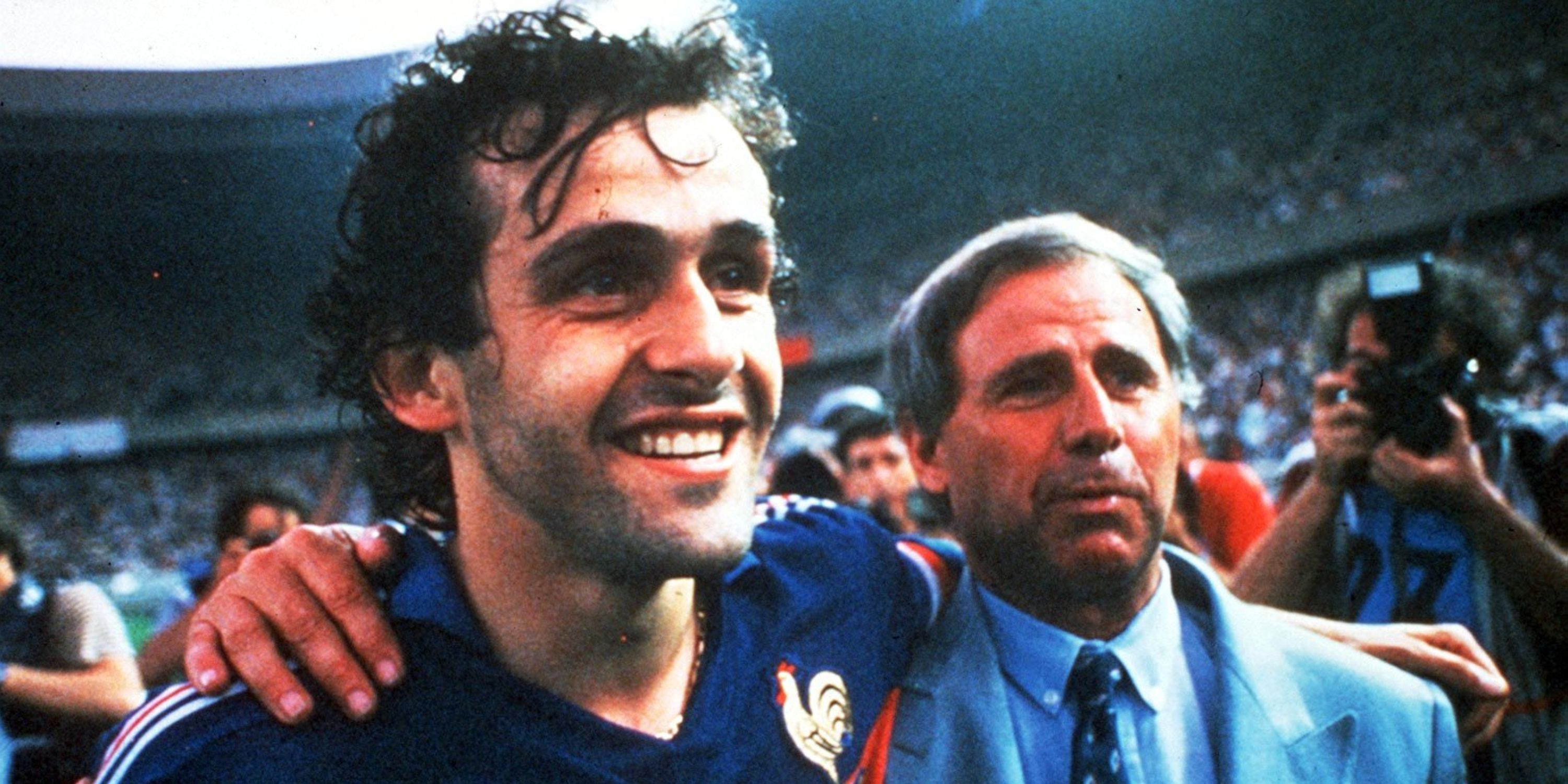 Michel Platini celebrating France's Euro 1984 victory, a defining moment of his legendary career and French football history.
Michel Platini celebrating France's Euro 1984 victory, a defining moment of his legendary career and French football history.
Italy – 1968 & 2021
From Coin Toss to Wembley Glory
Italy has won the European Championship twice, with victories separated by over five decades, highlighting different eras of Italian football. Their first triumph came in Euro 1968, hosted on home soil. In a unique turn of events, Italy reached the final after winning a coin toss against the Soviet Union in the semi-final following a 0-0 draw. The final itself was also unusual, requiring a replay after a 1-1 draw with Yugoslavia. In the replay, Italy decisively won 2-0, securing their first European title in Rome.
More recently, Italy’s Euro 2021 victory at Wembley marked a resurgence of Italian football. Under Roberto Mancini, Italy played an attractive, attacking style, a departure from their traditionally defensive approach. They navigated a challenging path, defeating Spain on penalties in the semi-finals and then England, also on penalties, in the final at Wembley. Leonardo Bonucci’s iconic “It’s coming Rome!” celebration captured the nation’s joy as Italy added their second European Championship to the winners list, showcasing their enduring footballing pedigree.
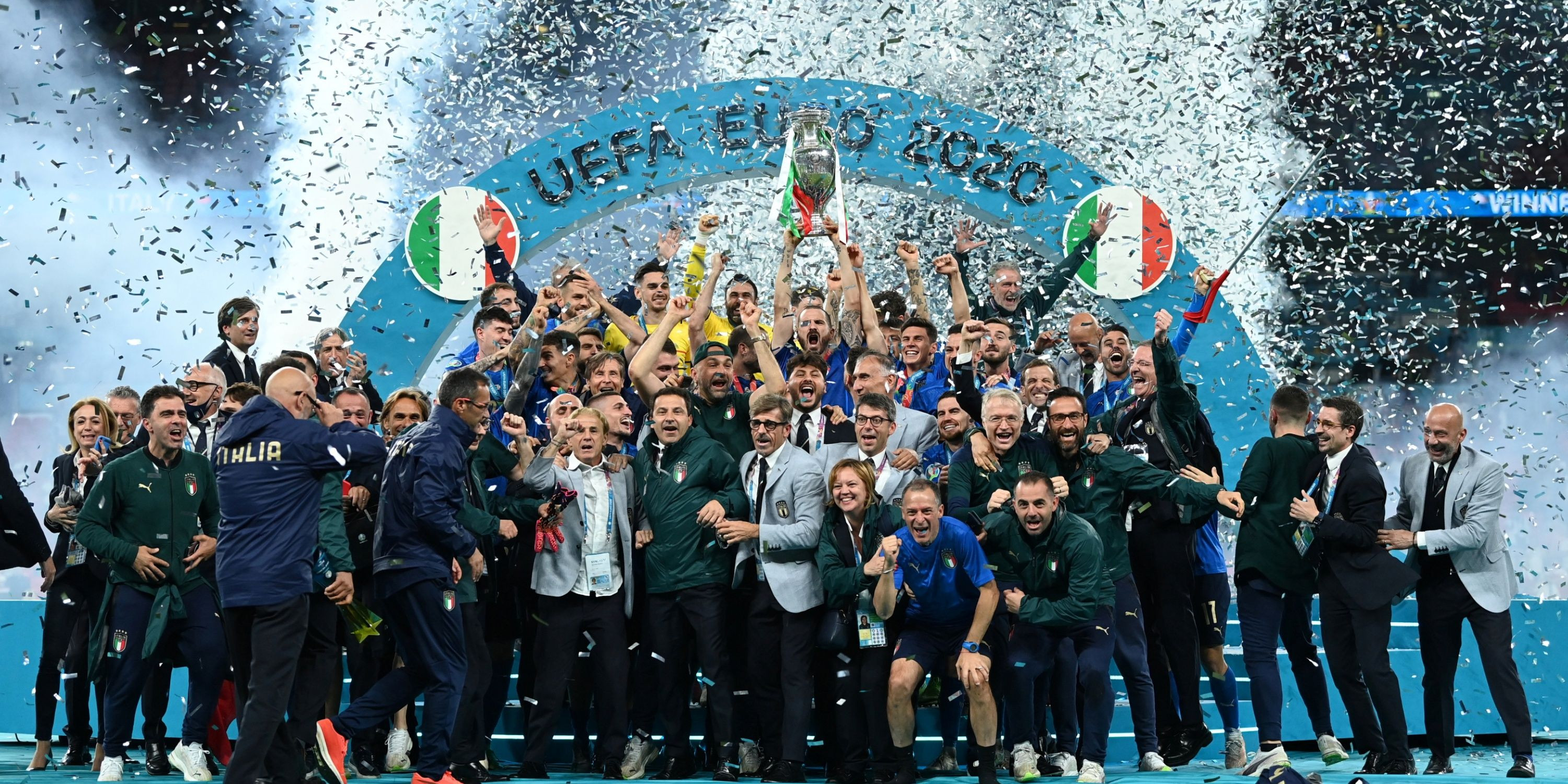 The Italy Euro 2020 winning team celebrating their championship at Wembley Stadium, a symbol of their resurgence and national pride.
The Italy Euro 2020 winning team celebrating their championship at Wembley Stadium, a symbol of their resurgence and national pride.
Germany (West Germany/Germany) – 1972, 1980 & 1996
A Record of Consistency and Three Titles
Germany, including West Germany, is one of the most successful nations in European Championship history, with three titles and a record of consistent participation and performance. West Germany’s first Euro victory came in 1972, with a dominant team featuring Franz Beckenbauer, Gerd Müller, and Günter Netzer. They showcased a blend of elegance and efficiency, defeating the Soviet Union 3-0 in the final.
Their second title arrived at Euro 1980 in Italy. While perhaps not as dominant as the 1972 team, West Germany still possessed quality and experience, overcoming Belgium 2-1 in the final. Unified Germany’s first Euro title came in 1996 at Wembley. In a tournament known for golden goal drama, Germany displayed resilience and tactical flexibility, defeating the Czech Republic 2-1 in the final with Oliver Bierhoff’s golden goal. These three victories, spanning different eras, underline Germany’s consistent strength and pedigree in European football.
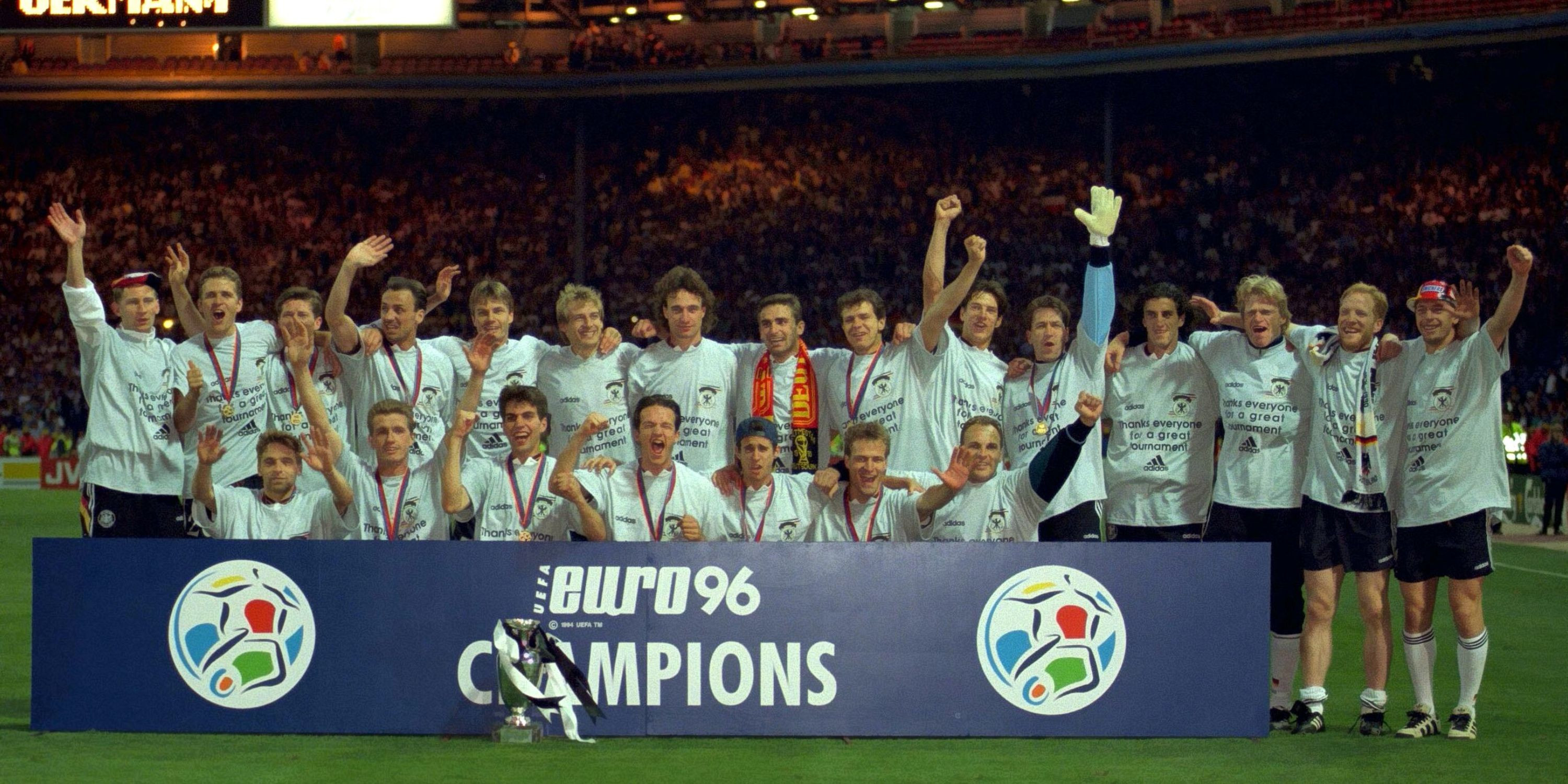 The Germany Euro 1996 winning team celebrating their victory at Wembley, a testament to their resilience and consistent success in European football.
The Germany Euro 1996 winning team celebrating their victory at Wembley, a testament to their resilience and consistent success in European football.
Spain – 1964, 2008, 2012 & 2024
Dominance Across Eras and Four Titles
Spain stands alone as the most successful nation in European Championship history, with four titles, showcasing their dominance across different eras. Their first victory came in Euro 1964, hosted in Spain. Under the Franco regime, Spain defeated the Soviet Union 2-1 in the final in Madrid, claiming their first major international trophy.
Decades later, Spain returned to the summit of European football with an unprecedented era of success from 2008 to 2012. Euro 2008, under Luis Aragonés, saw the emergence of “tiki-taka” style, with Spain playing possession-based, attacking football. They defeated Germany 1-0 in the final. Euro 2012, under Vicente del Bosque, saw Spain reach even greater heights, delivering a masterclass of possession football and defeating Italy 4-0 in the final. After a period of relative decline, Spain clinched their fourth title in Euro 2024, showcasing a new generation of talent and a more direct attacking approach, defeating England in the final. This unparalleled record of four European Championships firmly establishes Spain as the kings of European football and at the top of the Euro Championship winners list.
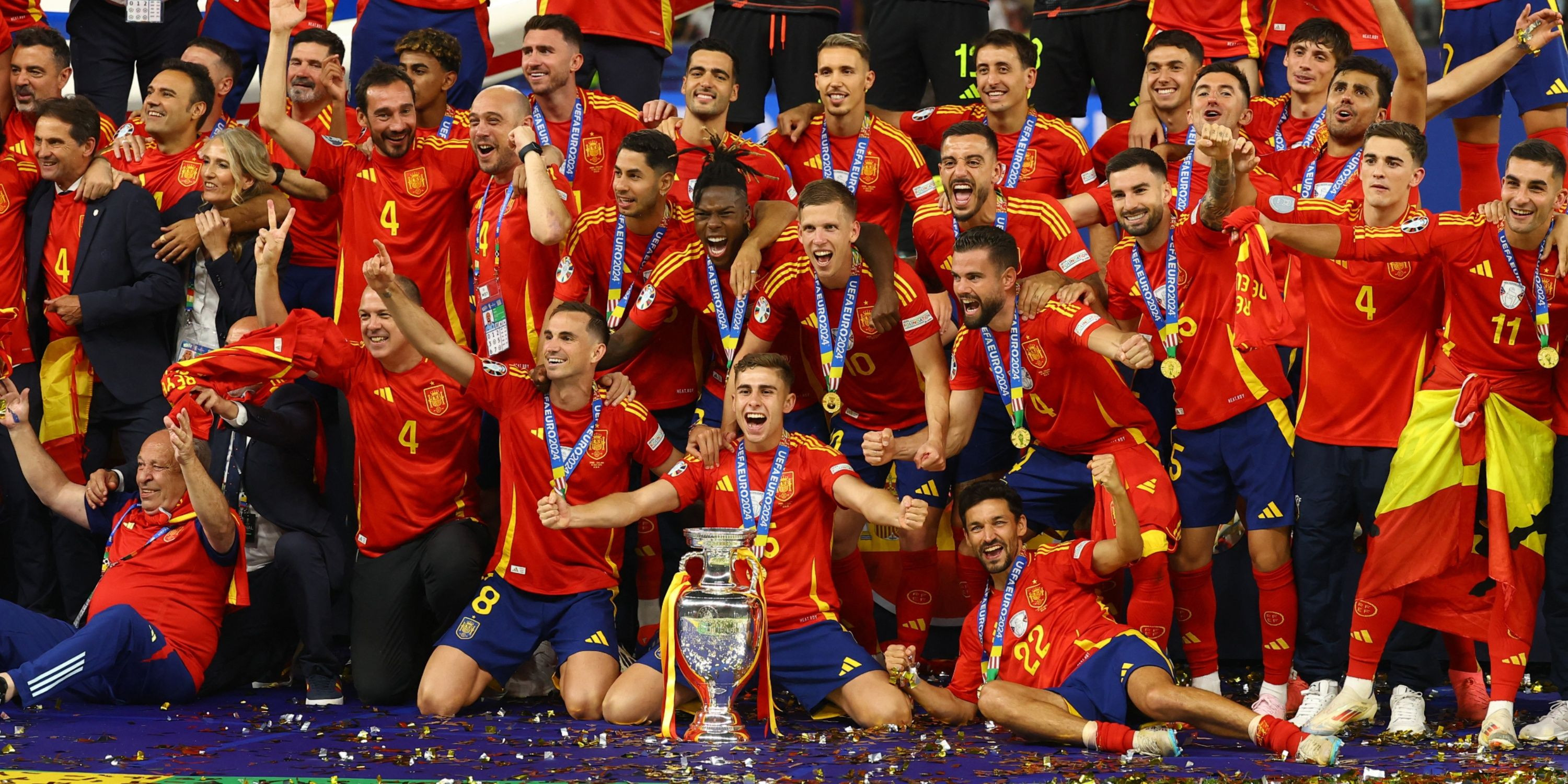 The Spain Euro 2024 winning team celebrating with the trophy, marking their fourth European Championship title and cementing their place as the most successful nation in the tournament's history.
The Spain Euro 2024 winning team celebrating with the trophy, marking their fourth European Championship title and cementing their place as the most successful nation in the tournament's history.
Conclusion
The Euro Championship winners list is a roll call of European footballing royalty, each victory carrying its own unique story of triumph, drama, and national pride. From the early pioneers of the Soviet Union to the modern dominance of Spain, the Euros has consistently delivered captivating narratives and unforgettable moments. As we look forward to future editions, the quest for the Henri Delaunay Trophy will undoubtedly continue to inspire and enthrall football fans across the continent and around the globe, adding new chapters to the rich history of the European Championship.
Information via UEFA.
